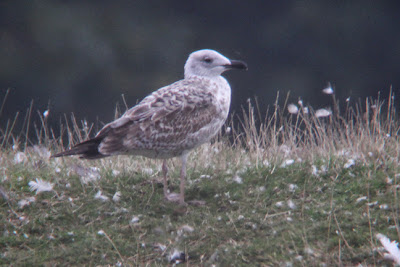I spent sometime at Shawell again last Saturday for a change and once more first-winter Yellow-legged Gulls were the highlight.
The first bird was most likely a female as it was a petite individual. I was happy that all the key features were visible including quite pale underwings. The tail had a black band which tapered at the outside edge and the rump and uppertail coverts were white with a few black spots. The nearby first-winter LBBGs had brownish underwings and the rumps and uppertail coverts were dull brown with extensive spotting.
In contrast to the first bird, the second one was a real monster. The plumage of the YLG in the photo below is, I believe, more advanced than that of the one in the first photograph.
Since my last posting, some fist year Herring Gulls are starting to replace their mantle and scapular feathers, so this feature has to be used with caution now when looking for first year YLGs. Below is a video of some of the first year YLGs and a short section of the third-winter Caspian. Look out for the Suffolk ringed Lesser Black-backed Gull and the escaped White-cheeked Pintail.
The first bird was most likely a female as it was a petite individual. I was happy that all the key features were visible including quite pale underwings. The tail had a black band which tapered at the outside edge and the rump and uppertail coverts were white with a few black spots. The nearby first-winter LBBGs had brownish underwings and the rumps and uppertail coverts were dull brown with extensive spotting.
 |
| First-winter Yellow-legged Gull |
Since my last posting, some fist year Herring Gulls are starting to replace their mantle and scapular feathers, so this feature has to be used with caution now when looking for first year YLGs. Below is a video of some of the first year YLGs and a short section of the third-winter Caspian. Look out for the Suffolk ringed Lesser Black-backed Gull and the escaped White-cheeked Pintail.
